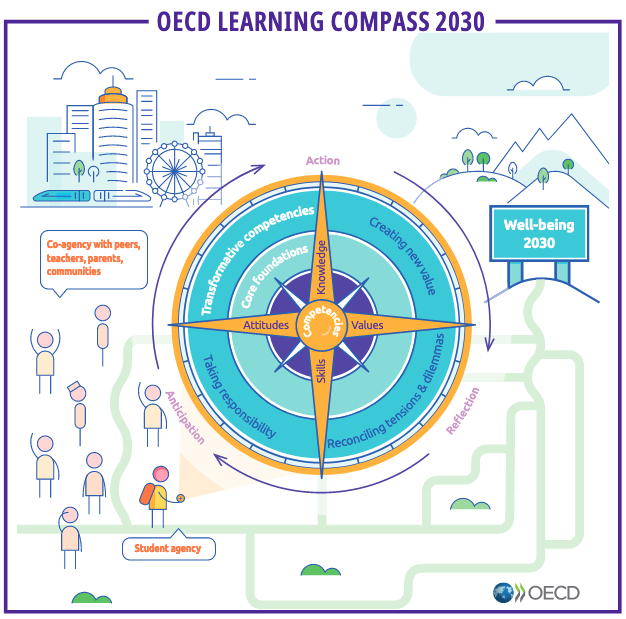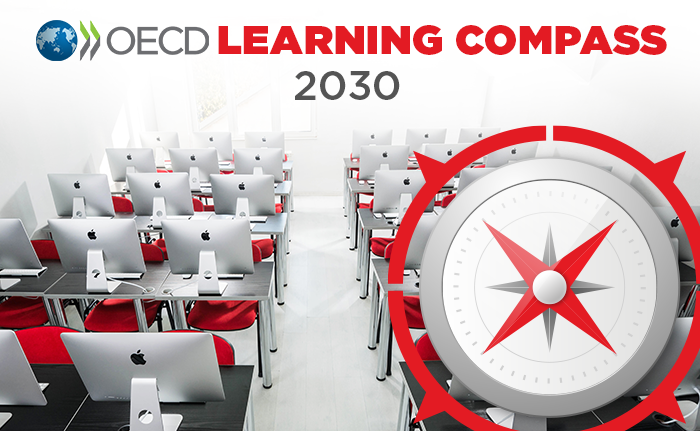How to be ten (or thirty) years ahead of your time
The accelerated and all-encompassing technological revolution, which is affecting all aspects of our lives on a daily basis, requires a radical transformation of all segments of society. One of its targets is education. Digitalization and artificial intelligence are just some of the innovations from the last fifty years that have altered goals and methods in education. With this in mind, the Organisation for Economic Co-operation and Development (OECD) developed the Learning Compass 2030. The Compass is the product of collaboration among government representatives, academic experts, school leaders, teachers, students and social partners from around the world who have a genuine interest in supporting positive change in education systems.
The OECD standards, tailored according to a projection of the future, have been applied by the LINK Educational Alliance in its institutions since LINKgroup’s foundation in 1998. Having stayed true to these standards, the Alliance will strive to enhance them and move at least one step beyond the destination at which education, according to the instructions of globally renowned economists and analysts, should arrive in the following decade. The LINK edu Alliance illustrated this intention in the recently adopted education strategy.
Curricular and extra-curricular agendas tailored to students' needs
The OECD Learning Compass 2030 is neither an assessment framework nor a curriculum framework, but a detailed elaboration of a wide range and types of learning within a broad structure.
The authors have assessed the value of gaining new knowledge and skills, acknowledging that learning does not only happen in school, which is one of the leading ideas of the LINK edu Alliance.
Therefore, in addition to instruction, the company provides its students with a string of extracurricular activities and clubs they can choose in accordance with their needs and wishes. That supports the claim that not only schooling is personalized but recreation as well.
Environmentalists, athletes, artists, linguists and scientists, together with LINK Educational Alliance teachers, pull together their greatest passion and strength and use them to the fullest extent for their benefit and that of the entire community.
The notion of societal well-being has changed over the years to encompass far more than economic and material prosperity. Even though there may be many different visions of the future we want, the well-being of society is a shared destination.
A holistic approach to 21st-century education in theory and in practice
Due to the fact that society is ever-changing, the Compass is designed as a developing concept. Also, although applicable globally, it can be tailored to the needs of local governments, teachers and schools.
The OECD Learning Compass 2030 provides insight as to what future generations should learn in order to advance, how they should do it and why, what kind of qualifications, attitudes and values will be required in the new age, how people will achieve their full potential and whether this will benefit everyone or just themselves.
Hence, the components of the compass include core foundations, knowledge, skills, attitudes and values, transformative competencies and a cycle of anticipation, action and reflection. The concept of student agency is central to the Learning Compass 2030, as the compass is a tool students can use to orient themselves as they exercise their sense of purpose and responsibility while learning to influence the people, events and circumstances around them for the better.

The Compass is a metaphor adopted to emphasize the need for students to learn to navigate by themselves through unfamiliar contexts, and find their direction in a meaningful and responsible way, instead of simply receiving fixed instructions or directions from their teachers.
The extensive changes in the world require current and future generations to make a U-turn in their behavior and perception of the environment compared to their predecessors in the classroom – instead of being indifferent and static, they should be proactive and engaged in the advancement of our society.
OECD skills for the new age
According to the creators of the OECD project, skills are defined as the ability and capacity to carry out processes and be able to use one’s knowledge in a responsible way to achieve a goal. Skills are part of a holistic concept of competency, involving the mobilization of knowledge, skills, attitudes and values to meet complex demands.
The OECD Learning Compass 2030 distinguishes between three different types of skills:
- cognitive and metacognitive skills – critical thinking, creative thinking, learning-to-learn and self-regulation;
- social and emotional skills – empathy, self-efficacy, responsibility and collaboration;
- physical and practical skills.
Cognitive skills are a set of thinking strategies that enable the use of language, numbers, reasoning and acquired knowledge. Metacognitive skills include learning-to-learn skills and the ability to recognize one’s knowledge, skills, attitudes and values. Metacognition refers to the skills of “thinking about thinking”. It can be understood as analytical skills in which awareness of one’s own learning and thought processes leads to the intentional application of specific learning techniques to different situations.
Social and emotional skills are a set of individual capacities that can be manifested in consistent patterns of thoughts, feelings and behaviors that enable people to develop themselves, cultivate their relationships, and exercise their civic responsibilities.
Physical skills are a set of abilities to use physical tools, operations and functions. They include manual skills, such as the ability to use information and communication technology devices and new machines, play musical instruments, craft artworks, play sports, etc. They also include life skills, such as the ability to dress oneself, prepare food and drink, keep oneself clean; and the ability to mobilize one’s capacities, including strength, muscular flexibility and stamina. Practical skills are those required to use and manipulate materials, tools, equipment and artefacts to achieve particular outcomes.
The Link edu Alliance degree guarantees the willingness to change
Knowing that people require a wide range of skills, knowledge and characteristics so as to adapt to the dynamic landscape of today’s world, the educational institutions operating under the LINK edu Alliance strive to provide students with degrees that will enable them not just to have a promising career, but to have a least common factor for everything that’s universally necessary in life.
At the beginning of the 20th century, a literate person was one who could read, write and count. In the digital age, however, literacy includes information and media literacy, critical thinking and problem solving, teamwork, and the ability to use new technology. Being up-to-date with the latest scientific and technological trends gives the LINK edu Alliance students an opportunity to learn how to use technology in a rational and creative way, which will eventually result in innovation and revolutionary discoveries.
To remain competitive, workers will need to acquire new skills continually, which, according to the Compass, requires flexibility, a positive attitude towards lifelong learning and curiosity. The LINK edu Alliance recognized this from the get-go. In addition to focusing on the development of the aforementioned OECD skills through the 4C approach (collaboration, communication, creativity and critical thinking), our teachers and professors strive to teach students how to be adaptable and develop a lifelong desire to gain new knowledge and skills. Their mission is to enable students to independently navigate through unknown situations and circumstances, which are becoming increasingly common given the current dynamics in the world.
LINK edu Alliance students are destined to become versatile professionals fully prepared for life and work in the 21st century.




Leave a comment